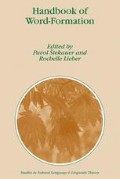Access this chapter
Tax calculation will be finalised at checkout
Purchases are for personal use only
Preview
Unable to display preview. Download preview PDF.
References
Aitchison, Jean. 1994. Words in the Mind — an introduction to the mental lexicon. 2nd edition, Oxford: Blackwell.
Aronoff, Mark. 1976. Word Formation in Generative Grammar. Cambridge, Mass.: MIT Press.
Aronoff, Mark. 1988. Review of: Di Sciullo/Williams (1987). Language 64, 766–770.
Aronoff, Mark and Anshen, Frank. 1998. “Morphology and the Lexicon.” In: A. Spencer and A. Zwicky (eds.), 237–247.
Bauer, Laurie. 1983. English Word-formation. Cambridge: Cambridge University Press.
Bauer, Laurie. 2001. Morphological Productivity. Cambridge: Cambridge University Press.
Brekle, Herbert and Kastovsky, Dieter (eds.). 1977. Perspektiven der Wortbildungsforschung. Beiträge zum Wuppertaler Wortbildungskolloquium vom 9.–10 Juli 1976. Anläßlich des 70. Geburtstages von Hans Marchand am 1. Oktober 1977. Bonn: Bouvier.
Coseriu, Eugenio. 1967. “Lexikalische Solidaritäten.” Poetica 1, 293–203.
Crystal, David. 2001. Language and the Internet. Cambridge: Cambridge University Press.
De Jong, Nivja H.; Schreuder, Robert; and Baayen, Harald, R. 2000. “The morphological family size effect and morphology.” Language and Cognitive Processes 15, 329–365
Di Sciullo, Anna-Maria and Williams, Edwin. 1987. On the Definition of Word. Cambridge, Mass.: MIT Press.
Downing, Pamela. 1977. “On the creation and use of English compound nouns.” Language 53, 810–842.
Halle, Morris. 1973. “Prolegomena to a theory of word-formation.” Linguistic Inquiry 4, 3–16.
Herbermann, Clemens-Peter. 1981. Wort, Basis, Lexem und die Grenze zwischen Lexikon und Grammatik. München: Fink.
Heringer, Hans Jürgen. 1984. “Wortbildung: Sinn aus dem Chaos.” Deutsche Sprache 12, 1–13.
Hohenhaus, Peter. 1996. Ad-hoc Wortbildung — Terminologie, Typologie und Theorie kreativer Wortbildung im Englischen. Frankfurt/M., Berlin, Bern, New York, Paris, Wien: Peter Lang.
Hohenhaus, Peter. 1998. “Non-Lexicalizability as a Characteristic Feature of Nonce Word-Formation in English and German.” Lexicology 4/2, 237–280.
Hohenhaus, Peter. 2000. “An Overlooked Type of Word-Formation: Dummy-compounds in German and English.” In: Ch. Hall and D. Rock (eds.), German Studies towards the Millennium. Oxford, Bern, Berlin, Bruxelles, Frankfurt/M., New York, Wien, 241–260.
Hohenhaus, Peter. 2004. “Identical Constituent Compounds — a Corpus-based Study.” Folia Linguistica 38/3–4, 297–331.
Hohenhaus, Peter. 2005a. “Elements of traditional and ‘reverse’ purism in relation to computer-mediated communication.” In: N. Langer and W. Davies (eds.), Linguistic Purism in the Germanic Languages. Berlin, New York: De Gruyter, 186–202.
Hohenhaus, Peter. 2005b. “Where Word-Formation cannot Extend the Vocabulary-Creativity, Productivity and the Lexicon in Synchronic and Diachronic Morphology.” In: D. Kastovsky and A. Mettinger (eds.), Lexical Change and the Genesis of the English Vocabulary. Berlin, New York: Mouton de Gruyter.
Hughes, Geoffrey. 2000. A History of English Words. Oxford: Blackwell.
Jackendoff, Ray. 1975. “Morphological and Semantic Regularities in the Lexicon.” Language 51, 639–671.
Jackendoff, Ray. 1997. The Architecture of the Language Faculty. Cambridge, Mass.: MIT Press.
Kastovsky, Dieter. 1982a. Semantik und Wortbildung. Düsseldorf, Bern, München: Bagel/Francke.
Kastovsky, Dieter. 1982b. “Word-Formation: A Functional View.” Folia Linguistica 16, 181–198.
Kastovsky, Dieter. 1993. The Place of WF in Grammar: A Historical Survey. ICOLS.
Kjellmer, Göran. 2000. “Potential Words.” Word 51/2, 205–228.
Leech, Geoffrey. 1974. Semantics. Harmondsworth: Penguin.
Lehmann, Christian. 2002. New reflections on grammaticalization and lexicalization. In: I. Wischer and G. Diewald (eds.), New Reflections on Grammaticalization. Amsterdam, Philadelphia: John Benjamins, 1–18.
Lieber, Rochelle. 1981. On the Organization of the Lexicon. Bloomington, Indiana: Indiana University Linguistics Club.
Lieber, Rochelle. 1988. “Phrasal Compounds in English and the Morphology-Syntax Interface.” In: Papers from the 24 th Annual Regional Meeting of the Chicago Linguistics Society. Part Two: Parasession on Agreement in Grammatical Theory (= CLS 14), 175–184.
Lieber, Rochelle. 1992. Deconstructing Morphology. Chicago, London: University of Chicago Press.
Lipka, Leonhard. 1977. “Lexikalisierung, Idiomatisierung und Hypostatisierung als Probleme einer synchronen Wortbildungslehre.” In: H. Brekle and D. Kastovsky (eds.), 1977, 155–163.
Lipka, Leonhard. 1981. “Zur Lexikalisierung im Deutschen und Englischen.” In: L. Lipka and H. Günther (eds.), Wortbildung. Darmstadt: Wissenschaftliche Buchgesellschaft, 119–132.
Lipka, Leonhard. 2002. English Lexicology: Lexical structure, word semantics & word-formation. Tübingen: Narr.
Lyons, John. 1977. Semantics. Cambridge: Cambridge University Press.
McQueen, James M. and Cutler, Anne. 1998. “Morphology in Word Recognition.” In: A. Spencer and A. Zwicky (eds.),1998, 406–427.
McWhorter, John. 2001. The Power of Babel — a Natural History of Language. New York: Henry Holt/Times.
Meys, Willem, 1975. Compound Adjectives in English and the Ideal Speaker-Listener. Amsterdam: North Holland.
Meys, Willem. 1985. “Morphological meaning and the structure of the mental lexicon.” In: A. J. Geer, P. Hoppenbrouwers, A. M. Seuren, and T. Weijters (eds.), Meaning and the Lexicon. Dordrecht: Foris, 76–85.
Motsch, Wolfgang. 1977. “Ein Plädoyer für die Beschreibung von Wortbildungen auf der Grundlage des Lexikons.” In: H. Brekle and D. Kastovsky (eds.), 180–202.
Pinker, Steven. 1994. The Language Instinct. London: Penguin.
Selkirk, Elizabeth. 1982. The Syntax of Words. Cambridge, Mass.: MIT Press.
Spencer, Andrew and Zwicky, Arnold. 1998. The Handbook of Morphology. Oxford: Blackwell.
Štekauer, Pavol. 2000. English Word-Formation — A History of Research (1960–1995). Tübingen: Gunter Narr.
Štekauer, Pavol. 2002. “On the Theory of Neologisms and Nonce-formations.” Australian Journal of Linguistics 22/1, 97–112.
Toman, Jindřich, 1983. Wortsyntax. Tübingen: Niemeyer.
Weinreich, Uriel. 1969. “Problems in the Analysis of Idioms.” In: J. Puhvel (ed.), Substance and Structure of Language. Los Angeles, Berkeley: University of California Press.
Welte, Werner. 1996. Englische Morphologie und Wortbildung. 2nd edition. Frankfurt/M, Berlin, Bern, New York, Paris, Wien: Peter Lang.
Wray, Alison. 2002. Formulaic Language and the Lexicon. Cambridge: Cambridge University Press.
Author information
Authors and Affiliations
Editor information
Editors and Affiliations
Rights and permissions
Copyright information
© 2005 Springer
About this chapter
Cite this chapter
Hohenhaus, P. (2005). Lexicalization and Institutionalization. In: Štekauer, P., Lieber, R. (eds) Handbook of Word-Formation. Studies in Natural Language and Linguistic Theory, vol 64. Springer, Dordrecht. https://doi.org/10.1007/1-4020-3596-9_15
Download citation
DOI: https://doi.org/10.1007/1-4020-3596-9_15
Publisher Name: Springer, Dordrecht
Print ISBN: 978-1-4020-3595-1
Online ISBN: 978-1-4020-3596-8
eBook Packages: Humanities, Social Sciences and LawSocial Sciences (R0)

